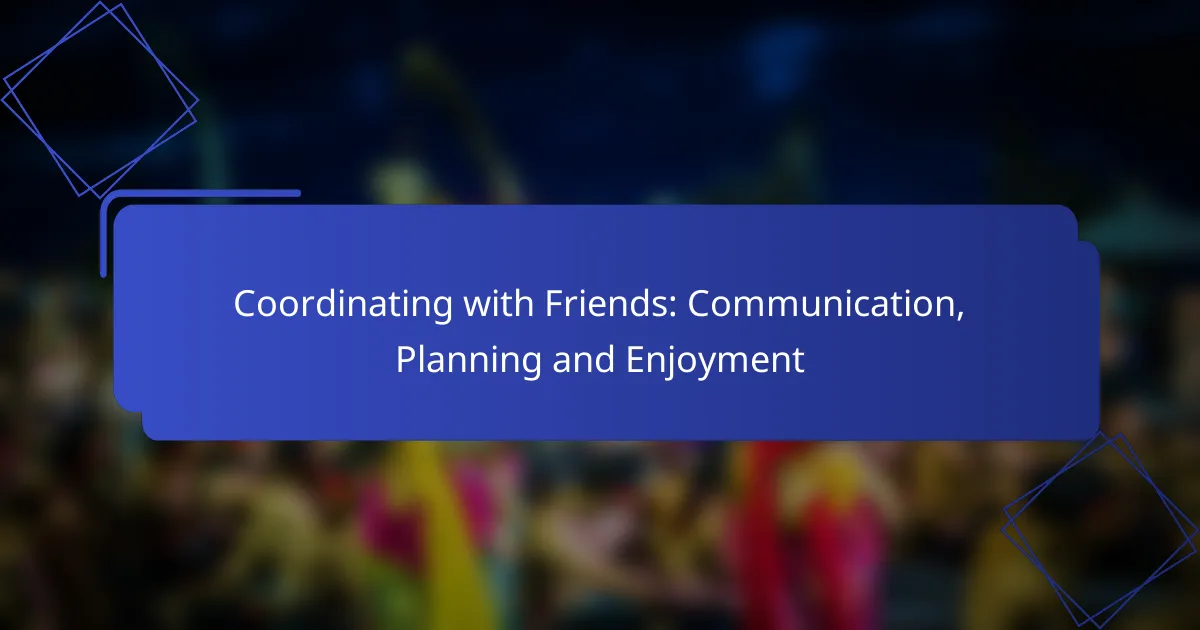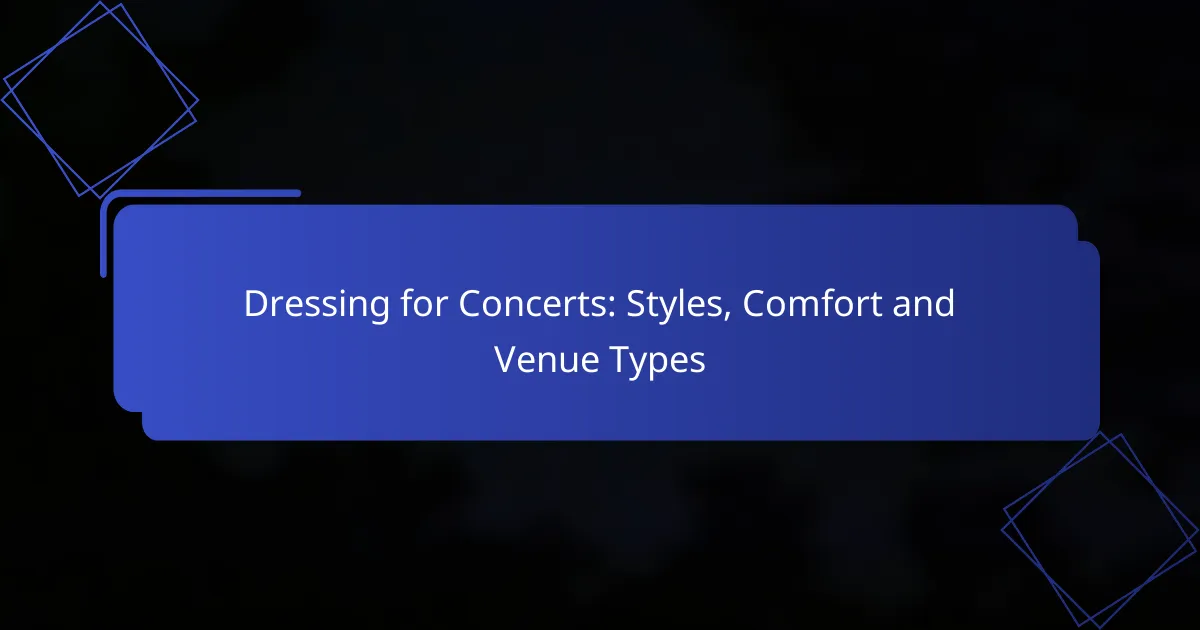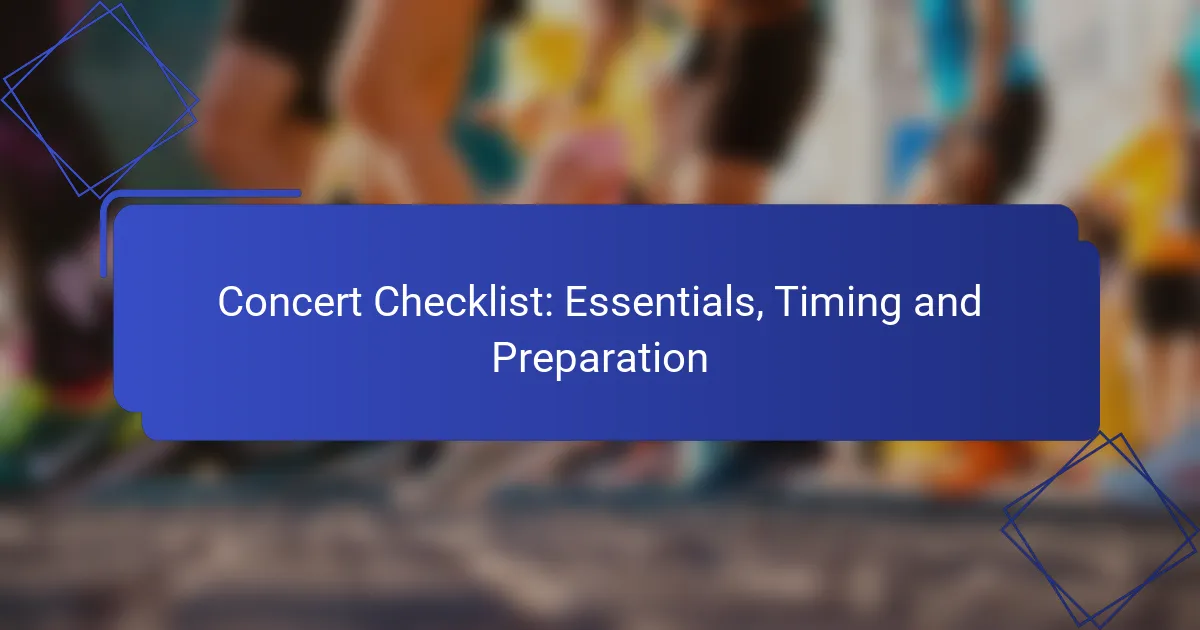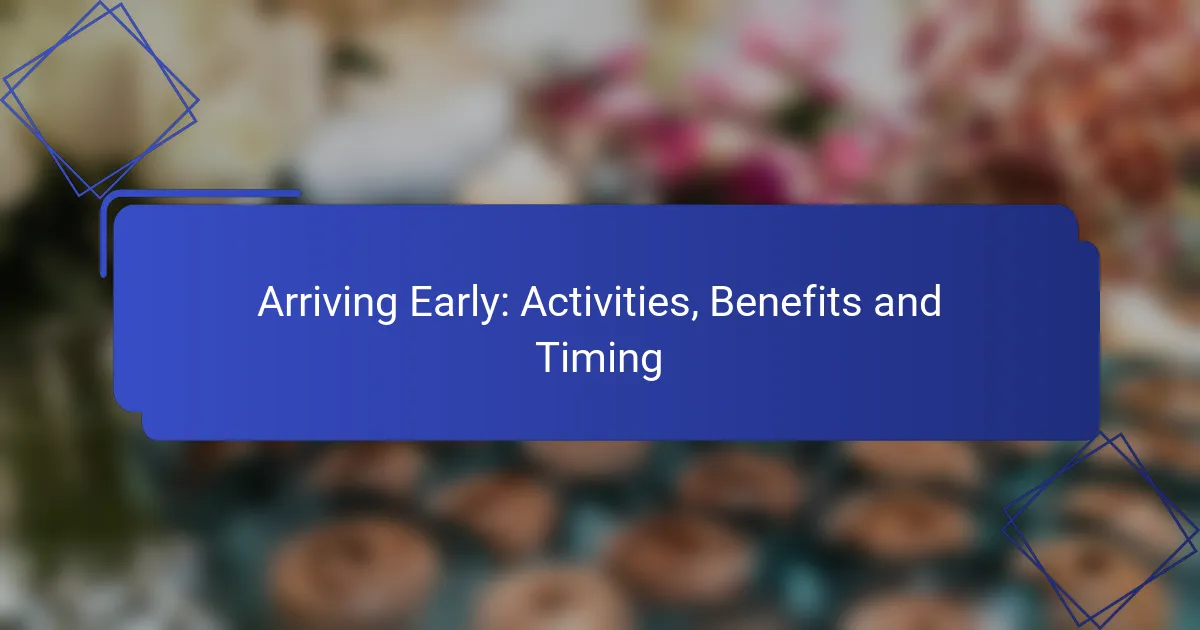Coordinating with friends requires effective communication and thoughtful planning to ensure everyone is engaged and excited about the activities. Utilizing tools such as event planning apps and shared calendars can streamline the process, making it easier to align schedules and preferences. By actively involving friends in decision-making and considering their interests, you can create enjoyable experiences that everyone will appreciate.
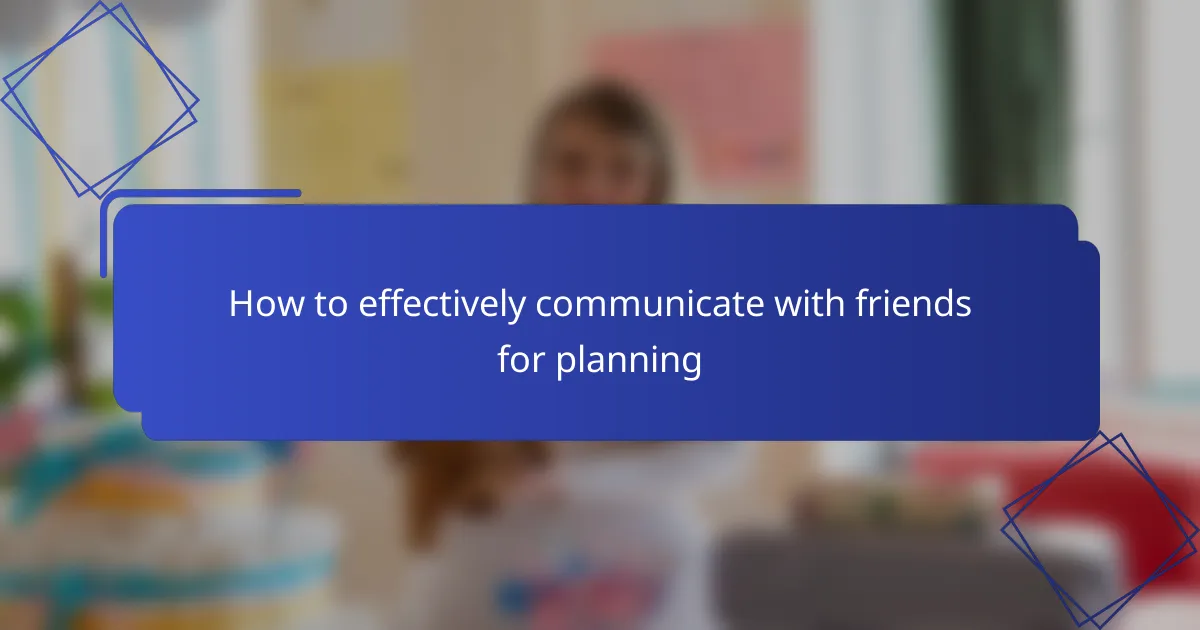
How to effectively communicate with friends for planning
Effective communication with friends is essential for successful planning. Utilizing various tools and methods can streamline the process, ensuring everyone is on the same page and engaged.
Use messaging apps like WhatsApp
Messaging apps such as WhatsApp are ideal for quick and efficient communication. They allow for instant messaging, voice notes, and even video calls, making it easy to share ideas and updates in real-time.
Consider creating a dedicated group chat for specific events. This keeps all relevant discussions in one place, reducing confusion and ensuring everyone has access to the same information.
Schedule calls using Google Calendar
Google Calendar is a powerful tool for scheduling calls and meetings. You can create events, send invites, and set reminders, which helps ensure that everyone is aware of the timing and details.
When scheduling, try to choose times that accommodate most participants. Use the “Find a Time” feature to see when everyone is available, minimizing back-and-forth communication.
Utilize social media platforms for event coordination
Social media platforms like Facebook can be effective for coordinating events. You can create event pages where friends can RSVP, share details, and post updates, making it easy to keep everyone informed.
Be mindful of privacy settings when using social media for planning. Ensure that the event is set to private if you want to limit visibility to invited friends only, protecting your plans from unwanted attention.
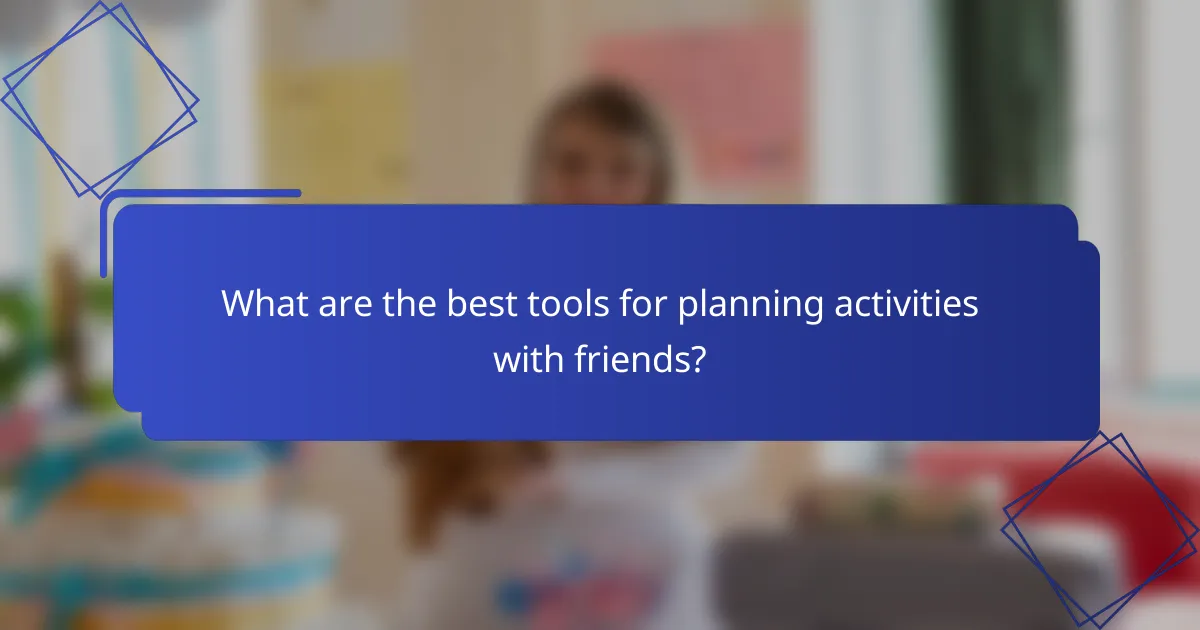
What are the best tools for planning activities with friends?
The best tools for planning activities with friends include event planning apps, group scheduling tools, and shared calendars. These tools help streamline communication and ensure everyone is on the same page, making it easier to coordinate plans.
Event planning apps like Eventbrite
Event planning apps such as Eventbrite allow users to create, promote, and manage events efficiently. You can set up an event page, send invitations, and track RSVPs, which simplifies the organization process for gatherings, parties, or outings.
Consider using these apps for larger events where ticketing or registration is necessary. They often provide promotional tools to help you reach a wider audience, making them ideal for public events or group activities.
Group scheduling tools like Doodle
Group scheduling tools like Doodle help friends find common availability for meetings or outings. Users can propose multiple dates and times, allowing participants to indicate their preferences, which makes it easier to settle on a time that works for everyone.
These tools are particularly useful for coordinating group activities like dinners or trips. Keep in mind that some tools may offer premium features for a fee, but the basic functionalities are usually sufficient for casual planning.
Shared calendars on platforms like Apple Calendar
Shared calendars, such as those on Apple Calendar, enable friends to view and manage each other’s schedules. By sharing a calendar, you can easily see when others are free or busy, facilitating smoother planning for events.
To maximize effectiveness, ensure everyone involved is comfortable with the platform and knows how to use its features. This can help avoid scheduling conflicts and ensure that all participants are informed about upcoming plans.
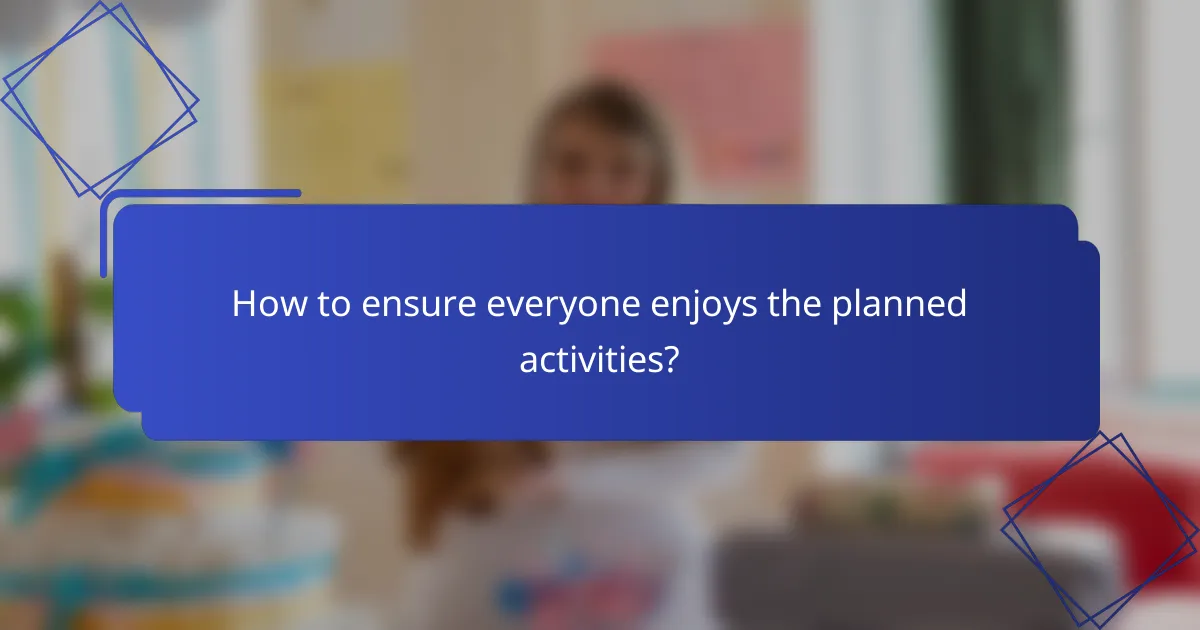
How to ensure everyone enjoys the planned activities?
To ensure everyone enjoys the planned activities, it’s essential to actively involve friends in the decision-making process. By gathering their preferences, incorporating diverse interests, and providing flexible options, you can create a more inclusive and enjoyable experience for all participants.
Gather preferences through polls
Using polls is an effective way to collect preferences from your friends regarding activities. Online tools like Doodle or Google Forms allow you to create simple surveys that can capture everyone’s input efficiently. Aim to keep the polls concise, focusing on a few key options to avoid overwhelming participants.
Consider sending out the poll at least a week in advance of the planned activities. This gives everyone ample time to respond and ensures that you can make decisions based on the majority’s preferences.
Incorporate diverse interests in planning
When planning activities, it’s vital to consider the diverse interests of your group. This might mean mixing different types of events, such as outdoor adventures, cultural outings, or casual get-togethers. By offering a variety of options, you can cater to different tastes and ensure that everyone feels included.
For example, if some friends enjoy sports while others prefer arts and crafts, consider organizing a day that includes both a sports game and a creative workshop. This way, everyone has the chance to engage in something they love.
Provide options for flexibility
Flexibility in planning can significantly enhance enjoyment. Providing multiple time slots or alternative activities allows friends to choose what works best for them. This approach minimizes scheduling conflicts and increases participation rates.
For instance, if you’re organizing a weekend outing, consider offering a choice between a morning or afternoon start time. Additionally, having backup activities in case of bad weather can help keep the fun going regardless of external circumstances.
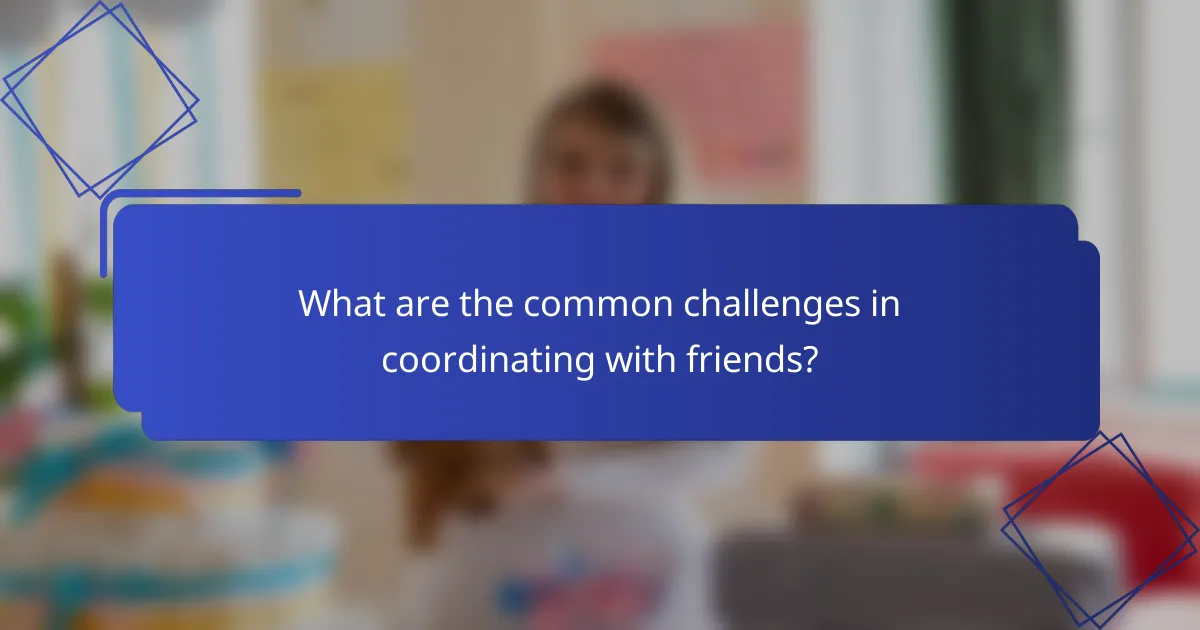
What are the common challenges in coordinating with friends?
Coordinating with friends often involves navigating several challenges that can hinder effective communication and planning. Key issues include scheduling conflicts, lack of communication, and diverse interests and preferences, all of which can complicate group activities.
Scheduling conflicts
Scheduling conflicts arise when friends have overlapping commitments, making it difficult to find a suitable time for everyone. This can include work obligations, family responsibilities, or personal plans that limit availability.
To mitigate scheduling issues, consider using shared calendars or scheduling apps that allow everyone to indicate their availability. Aim for a range of dates and times to increase the chances of finding a common slot.
Lack of communication
A lack of communication can lead to misunderstandings and missed opportunities for gathering. Friends may not share their preferences or availability, resulting in one person making plans that others are unaware of.
To improve communication, establish a group chat or use messaging apps that facilitate quick updates. Regular check-ins can help ensure everyone is on the same page and aware of any changes in plans.
Diverse interests and preferences
Diverse interests and preferences can create challenges when planning activities, as not everyone may enjoy the same types of outings. This can lead to frustration if one person’s idea is consistently favored over others.
To address this, consider rotating the responsibility of choosing activities among friends. This way, everyone has a chance to suggest something they enjoy, fostering inclusivity and ensuring that plans cater to a wider range of interests.
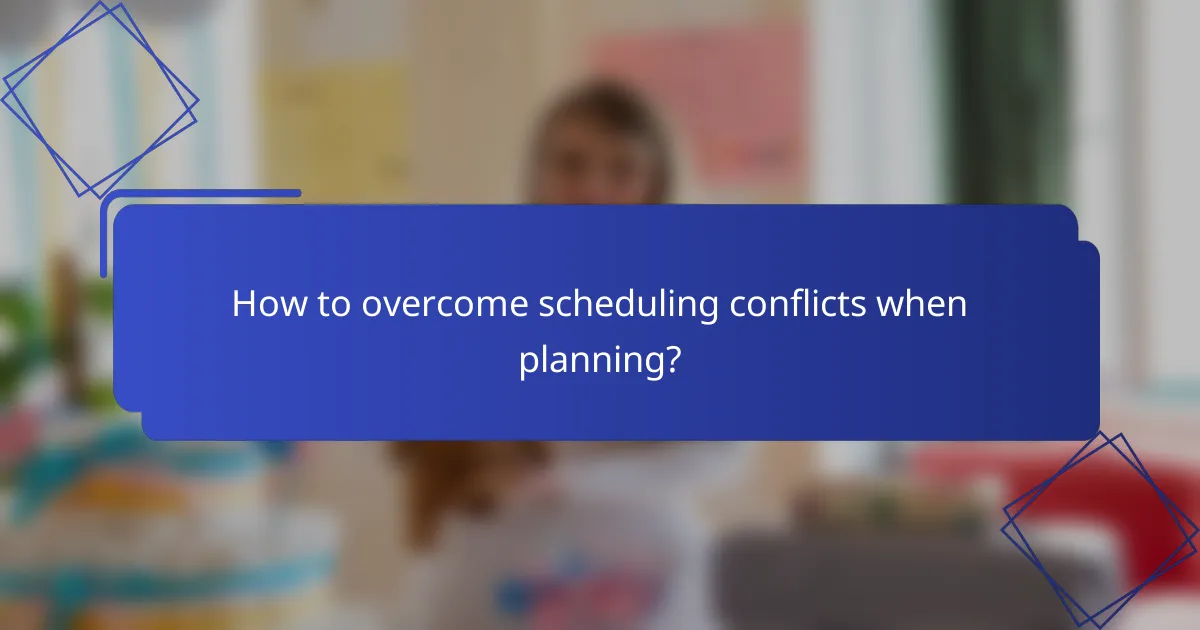
How to overcome scheduling conflicts when planning?
To overcome scheduling conflicts when planning with friends, effective communication and organization are essential. Utilizing tools and strategies can help ensure everyone is on the same page and can participate in the planned activities.
Use a shared calendar
A shared calendar allows all participants to see available times and plan accordingly. Tools like Google Calendar or Outlook can facilitate this by sending notifications and updates to everyone involved.
When using a shared calendar, encourage everyone to mark their availability and any important commitments. This transparency helps in identifying common free slots and reduces back-and-forth communication.
Set a deadline for responses
Establishing a deadline for responses ensures that everyone commits to the planning process. A typical timeframe could be 48 to 72 hours, allowing enough time for everyone to check their schedules.
Communicate the deadline clearly and consider sending reminders as the date approaches. This helps to avoid last-minute changes and keeps the planning process efficient.
Consider alternative dates
When conflicts arise, being flexible with alternative dates can lead to better participation. Propose a few options that span over a week or two, which gives everyone a chance to find a suitable time.
Utilizing a poll or survey tool can help gauge interest in different dates. This method allows everyone to express their preferences easily and can lead to a consensus without extensive discussions.
